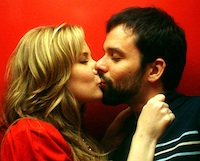 “I love you but I’m not in love with you” is a common phrase that I hear from couples contemplating coming into couples counselling with me. It’s a phrase that I hear so often I feel compelled to write a post about it. The aim of this post is to shed some light on what this phrase probably means and to help you to understand how this is normal. I will also give some suggestions on what you can do about these feelings within your relationship.
“I love you but I’m not in love with you” is a common phrase that I hear from couples contemplating coming into couples counselling with me. It’s a phrase that I hear so often I feel compelled to write a post about it. The aim of this post is to shed some light on what this phrase probably means and to help you to understand how this is normal. I will also give some suggestions on what you can do about these feelings within your relationship.
Let’s break down the phrase a little. “I love you” indicates that you have strong feelings and feel close and at home in your partners company. It sounds as if there is real potential within the relationship if only you knew how to free the energy from the stuck place it seems trapped in. The second part of the phrase “but I’m not in love with you” initially suggests that there is something wrong with the relationship and the love that you have for your partner is not enough. I disagree. I would like to translate this phrase for you as I see it.
The phrase to me indicates that the initial phase of the relationship has come to an end. In Imago Relationship therapy terms we call this the romantic phase. This is where you meet your partner and think that they are the most wonderful person on the entire planet! It’s characterised by the following key features:
Familiarity and timelessness:
You meet your partner and it’s as if you have known them forever! “Haven’t we met before?” you may ask. The answer in many ways to this question is yes, and no! You may not have met this individual before but you will most probably be very familiar with lots of their traits and characteristics because this person will fit with your imago. Your imago is the image of the person you need to be with to resolve your unmet childhood needs. It will be constructed from the good parts, and the bad parts of your parents, caregivers and significant people as you grew up. Yup, you fancy your Mum and Dad and with good reason (shudder at the thought)!!
Completion:
With your new partner you feel complete. They are your true “other half”. Again, this is kind of true according to Imago Relationship Therapy Theory. If you are quiet, you are likely to be attracted to someone who is a bit of a shouter, if you are a “feelings” person, you may well connect yourself up to a “thinker”. The theory states that we choose a partner that will offer us the most opportunity for growth.
Necessity:
This is the feeling that if your partner were to leave or be beamed up by aliens that happened to be passing by, you would simply collapse into a pile of useless Jelly on the floor. It’s as if you suddenly cannot comprehend your partner not being there.
Love drugs
Added to these four key parts of the romantic stage of the relationship is a heady cocktail of drugs. You are literally high as a kite, stoned on love. Your brain is pumping out endorphins, dopamine and other chemicals that are triggered even if you just think about your new love. No wonder we love love, we are off our face on love drugs!
I’m sorry to say, you know what’s coming next….the crash. When you have been in the romantic phase for long enough to form a strong bond with your partner you will enter the next phase, the power struggle. The drugs cannot be pumped out forever (shame as it may be) and you start to notice that other side of your Imago that you are not so keen on – all of those issues that you have with your caregivers that you need to resolve.
Common responses to the power struggle
It makes sense for you to try to recapture that love that you had in the romantic phase of the relationship and so that throws up a few choices for you. You can:
Bully your partner into being the perfect individual you saw them as when you chose them – bring on the arguments;
Dump your partner and go get another one – getting to go through the romantic phase all over again (I bet you know some serial monogamists who have a series of partners but never seem to make any relationship last?)
Have an affair – research has shown that the chemical buzz from the endorphins and other love drugs is enhanced by perceived risk;
For any of the above options you may find yourself saying “I love you, I’m just not in love with you”.
A different way
All of these choices are pretty rubbish and are unlikely to get your needs met, they are also likely to bring with them a great deal of pain and upset for you and your partner. But there is another way. Commit. Commit to your relationship and work towards deep love with your partner. Have a conscious relationship. By doing this the childhood wounds you set out to heal with your partner can be healed. You can grow and you can enable the growth of your partner too. But how do you do this?
The “how”
I guess the easiest way is to work with an Imago Relationship Therapist to guide you in the process but I think you can do it without this help, although it may be a little harder.
It’s about talking to each other in a straight way, asking for what you want and sharing your feelings with your partner. Staying away from the four horsemen of divorce and keeping your mouth shut at times when you really want to give your other half a good dressing down. It’s about seeing your partner as another wounded individual who is also just doing their best to heal and get their needs met.
I would also recommend that you read about Imago theory. I have a fair few posts on Imago so you can read me for free or you can buy the ultimate guide, Getting the Love You Want: A Guide for Couples by Harville Hendrix, the brains behind Imago Relationship Therapy.
“I love you, I’m just not in love with you” is a sign post. It says the easy stuff is over and now the more difficult and more rewarding journey has begun. The journey to deeper love.
Read the book! I Love You But I’m Not in Love with You: Seven Steps to Saving Your Relationship Click on the (affiliate) link to be taken to Amazon.
 You will notice that on my site I mix up the terms “counselling” and “therapy”. Is there a difference? For all intents and purposes there are no differences when I use these terms and I think that is pretty common across my peers too. Counsellors and therapists do have different qualifications and have gone through different processes to get “certified” but that should not necessarily make any difference to potential clients. Research has shown that all of
You will notice that on my site I mix up the terms “counselling” and “therapy”. Is there a difference? For all intents and purposes there are no differences when I use these terms and I think that is pretty common across my peers too. Counsellors and therapists do have different qualifications and have gone through different processes to get “certified” but that should not necessarily make any difference to potential clients. Research has shown that all of  What is the “Imago” and what does it have to do with how and why we choose our partner? As a psychologist and couples therapist, I’m often asked what my view is on what brings couples together, on what that attraction is, and what it is about. Here is my answer, and it lies within the concept of the Imago which I’ll explain shortly. Warning: if you’re looking for an answer that is about soulmates or karma or fate or beshert, you’ll be disappointed. My answer is based upon psychological principles.
What is the “Imago” and what does it have to do with how and why we choose our partner? As a psychologist and couples therapist, I’m often asked what my view is on what brings couples together, on what that attraction is, and what it is about. Here is my answer, and it lies within the concept of the Imago which I’ll explain shortly. Warning: if you’re looking for an answer that is about soulmates or karma or fate or beshert, you’ll be disappointed. My answer is based upon psychological principles.